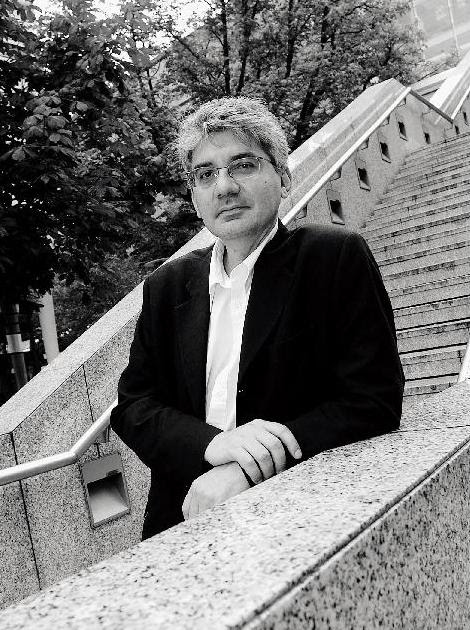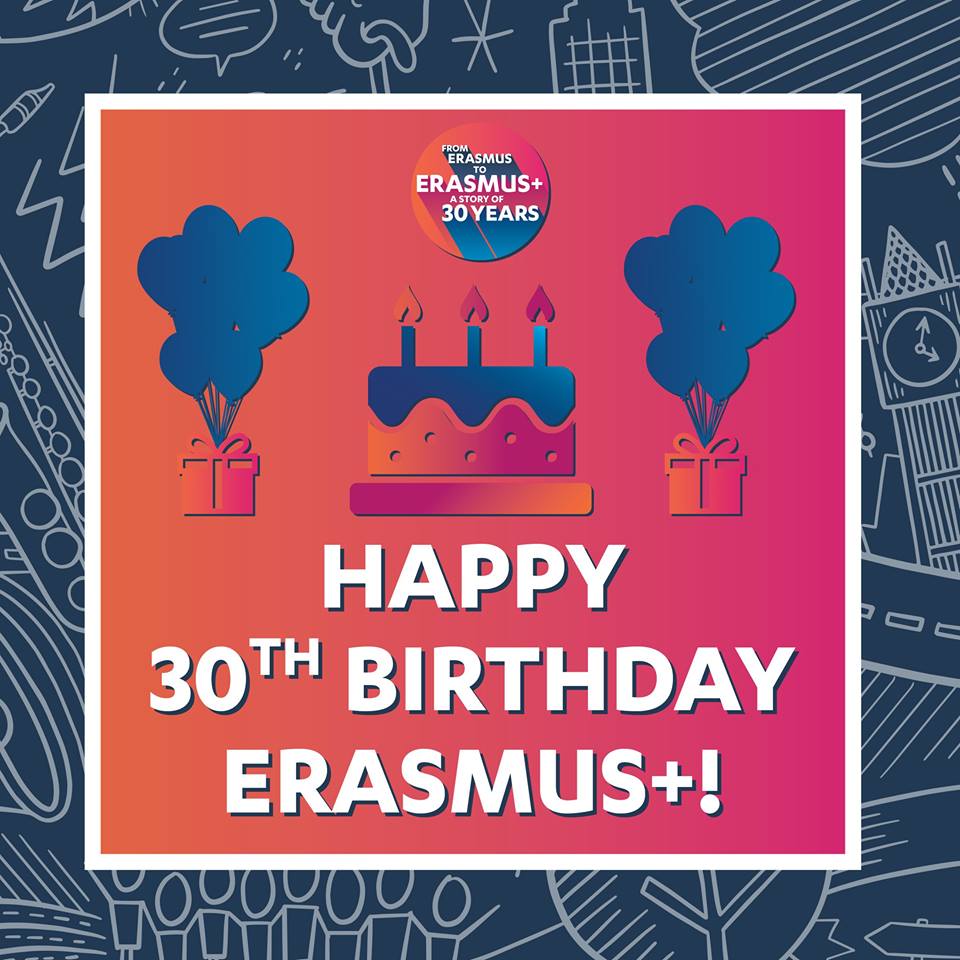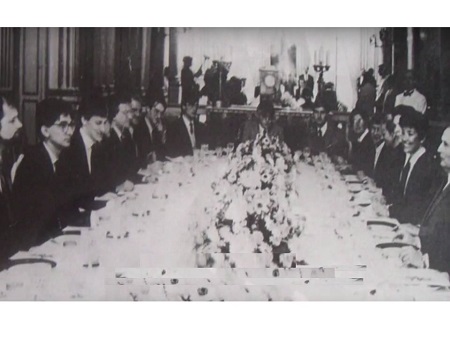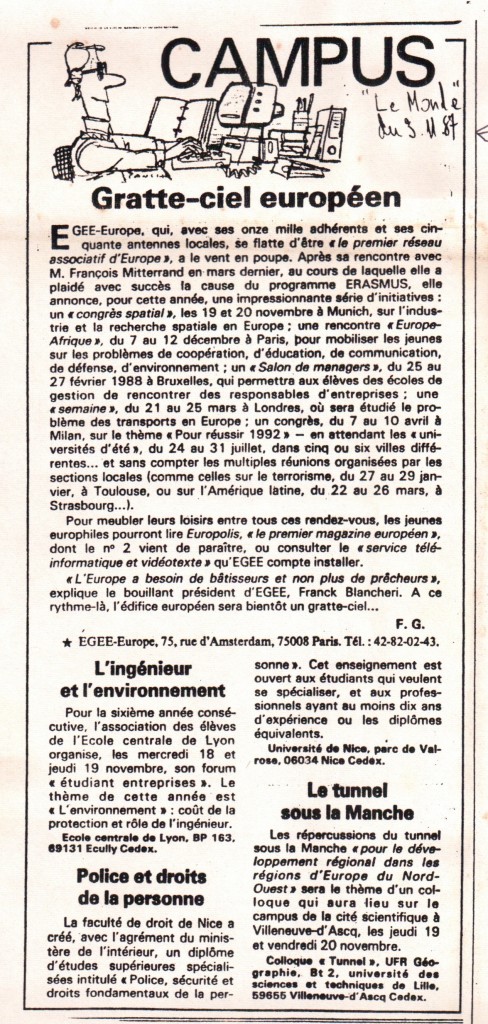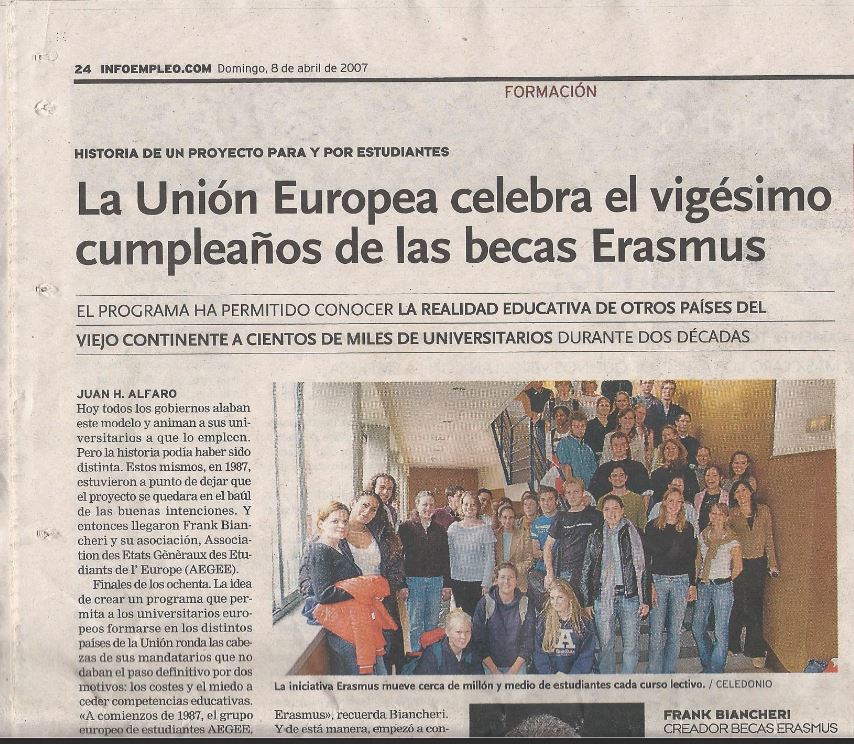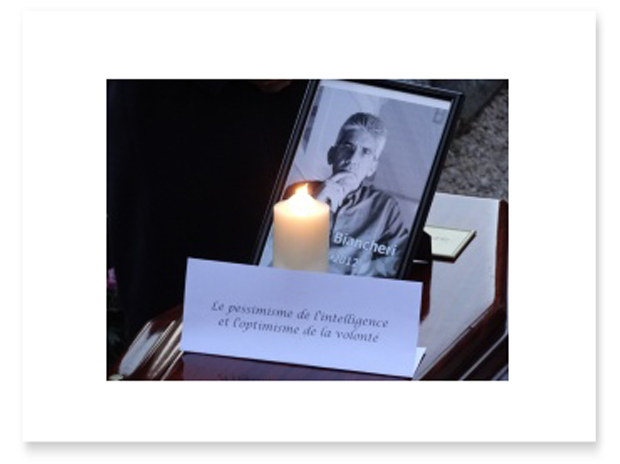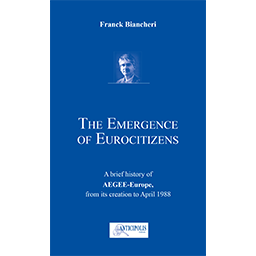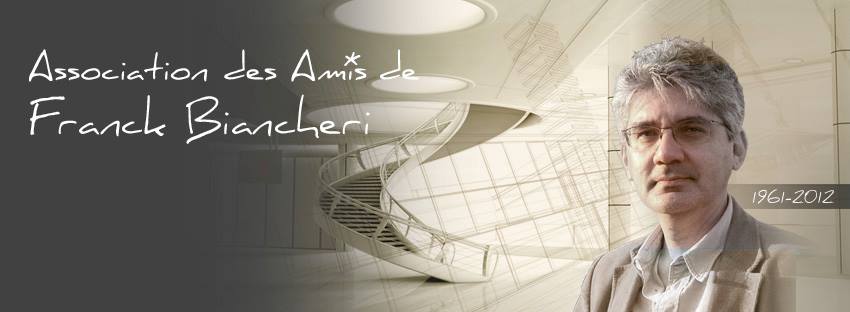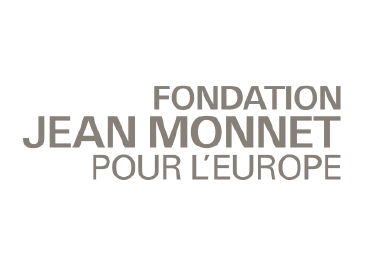Today Erasmus is 30 years old and we are offering you a special edition to cover this event. We are particularly proud to celebrate this anniversary. Because the success of this program is also the success of Franck Biancheri and AEGEE-Europe students who in 1987, as the prince charming delivered the Princess asleep.
A beautiful novel for European lovers, on which Franck Biancheri had also looked at: Réussir ses amours européens: conseils pratiques – Franck Biancheri, 17/03/2004 [divider]
Franck Biancheri’s history starts in 1984 when, as student at Sciences Po Paris and head of the Bureau des Elèves, he organises the first Etats Généraux des Etudiants d’Europe, a congress which gathers students from the Grandes écoles parisiennes (Polytechnique, HEC, Sciences-Po, etc…) and students from prestigious European universities. From this historical congress was born the first trans-European student association, AEGEE-Europe, which in just a few months developed into dozens of antennae throughout Europe (today, AEGEE-Europe gathers 13,000 members in some 200 antennae Europewide). Soon after its creation, the association found out about the project of a trans-European student mobility programme and was eager to see it happen… until it realised that despite the political will of national governments and the technical capacity of the European Commission to launch such a programme, national Ministries of education were in fact slowly but surely burrying the project. This situation brought Biancheri and AEGEE-Europe to their first feat : elaborate a strategy to unblock the adoption of the programme. Afther months of top-level “lobbying” in France, Germany, UK, Netherlands…, the strategy resulted in a lunch at the Elysée Palace between Biancheri and his team of Europeans on one side, and Mitterrand and his team of advisors on the other, in order to pass on to the President a message that the programme he wanted was not going to see the day of light. The next day, Mitterrand was reaffirming his will to see the programme exist and ERASMUS was finally adopted (on the adoption of ERASMUS thanks to AEGEE-Europe, interesting testimonials by Mr Lenarduzzi, formerly European Commission – video)
What Biancheri learnt from this experience was that Europe would go nowhere without its citizens and that EU democratisation was needed not only for moral reasons but for technical reasons of basic efficiency.
This opens the way to rethink where #Erasmus30 is going now? With 4 millions Erasmus parents and their babies, Erasmus generation is representing today 1% of the EU population, rather a weak result in 30 years of existence (it does not even reach the average of the European birth curves).
Why not challenging the programme, the politics and the Erasmus people by proposing to have in 2027, ten years to go, 10% of the EU youth population. This is future of Europe … and this is what Franck Biancheri advocated in 2008 when he called to have 10% of Erasmus students by 2010.
Here are some links, articles, videos and other documents to understand the little biography of ERASMUS and how Franck Biancheri planned to continue the Erasmus adventure:
[Franck Biancheri, l’Européen] ERASMUS 1987 (Video) – The key role European students played in the adoption of the ERASMUS programme
- ERASMUS was most likely never to exist… (David Carayol, 2007) – from January 1985: How everything started to the meeting Franck Biancheri / François Mitterrand, in March 1987
- The little blue book “The emergence of eurocitizens” (Editions Anticipolis) – The pages of the book also illuminate the meandering European Community decision-making process by telling the true story of the complex adoption of ERASMUS, the first large scale European programme addressing young people, in which AEGEE-Europe played a decisive role.
- ERASMUS … and then what ? Five proposals for a new European policy of education by 2010 (Franck Biancheri, 2002) – Fostering a real democratisation of the access to Europe by enabling 500,000 students per year to have join the European dimension for 20 million euro
- Enseignement supérieur: hors Europe, point de salut – Franck Biancheri, 2003 (FR)
- Les générations Erasmus face à leurs responsabilités politiques et démocratiques européennes (FR) – Franck Biancheri, 2006 – Refonder démocratiquement l’UE en commençant par refonder ses politiques en matière d’éducartion
- From the Treaty of Rome to Erasmus: The resounding anniversary of the European vision. Franck Biancheri, 2007 – Facing the challenges, different of course, but similar in size to those of the end of the Second World War: “the division of the continent and eternal national suspicions“, terrorist war, collapse of economic and social model, climate disasters … the Erasmus generations born after the Treaty of Rome are now forced to defend the EU founding principles : freedom, solidarity and democracy, not against nazism or fascism, but against all possible excesses of an unfinished system leading into that. … This step will require as much imagination, endeavour, courage and political will as the founders of the EU needed 50 years ago…
- Franck Biancheri – Erasmus (FR)
- 10% of Erasmus students by 2010 (EN) (vidéo)
and of course, ERASMUS: When citizens build Europe – Septembre 2015 – This video briefly tells the story of the adoption of the ERASMUS programme and the major role AEGEE and Franck BIancheri played in the process. Should be watched by all those interested in the ERASMUS programme’s very Citizen-based History or by those willing to be inspired by these European students’ pugnacity!
[divider]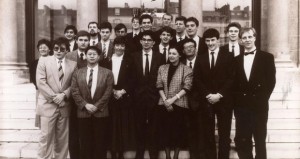 EGEE-Europe students on the steps of the Elysée, the day of the famous lunch with President Mitterand (March 1987)
EGEE-Europe students on the steps of the Elysée, the day of the famous lunch with President Mitterand (March 1987)
[divider]
 Archives Franck Biancheri Documentation or #erasmus
Archives Franck Biancheri Documentation or #erasmus
Aujourd’hui Erasmus a 30 ans et nous vous offrons une édition spéciale pour couvrir cet événement. Nous sommes particulièrement fiers de fêter cet anniversaire. Car le succès de ce programme est aussi le succès de Franck Biancheri et des étudiants de AEGEE-Europe qui en 1987, comme le prince charmant ont délivré la princesse endormie.
Un beau roman pour des amours européennes, sur lesquelles Franck Biancheri s’était également penché: Réussir ses amours européens: conseils pratiques – Franck Biancheri, 17/03/2004[divider]
L’histoire de Franck Biancheri commence en 1984 lorsqu’il est étudiant et Président du bureau des élèves à Science Po-Paris. Il organise alors le premier congrès des Etats Généraux des Etudiants d’Europe qui rassemble des étudiants des Grandes écoles parisiennes (Polytechnique, HEC, Science Po, etc..) et des étudiants de prestigieuses universités européennes. De ce congrès historique est née la première association trans-européenne d’étudiants, AEGEE-Europe, qui en quelques mois développa des dizaines d’antennes à travers l’Europe (aujourd’hui AEGEE compte 13.000 membres et 200 antennes dans toute l’Europe). Peu de temps après sa création, l’association apprenait l’existence d’un projet de programme trans-européen de mobilité étudiante qu’elle appelait de ses voeux … jusqu’à ce qu’elle réalise que malgré la volonté politique des gouvernements nationaux et les capacités techniques de la Commission Européenne à lancer un tel programme, les Ministères de l’éducation nationale était en sur le point d’enterrer le projet. Cette situation amena Biancheri et AEGEE-Europe à réaliser leur premier exploit en élaborant une stratégie pour débloquer l’adoption de ce programme. Après des mois de pression sur les décideurs en France, en Allemagne, au Royaume Uni, au Pays bas… la stratégie aboutit à un déjeuner officiel à l’Elysée entre Biancheri et son équipe d’européen, d’un côté, et Mitterrand et ses conseillers, de l’autre, dans le but de faire passer le message au Président que ce programme qu’il souhaitait n’allait pas voir le jour. Le jour suivant Mitterrand fit une déclaration réitérant sa volonté de voir le programme exister. Trois jours plus tard, ERASMUS était adopté (sur l’adoption d’ERAMUS grâce à AEGEE-Europe, voici trois intéressants témoignages : de Franck lui-même, et aussi ici, et de M. Lenarduzzi, ancien fonctionnaire à la Commission européenne).
Franck Biancheri a appris de cette expérience que l’Europe n’irait nulle part sans ses citoyens et que la démocratisation de l’Europe n’était pas seulement nécessaire pour des raisons morales mais aussi pour des raisons techniques de simple efficacité.
Ainsi est relancée la question de savoir où va #Erasmus30 maintenant? Avec 4 millions de parents Erasmus et leurs bébés, la génération Erasmus représente aujourd’hui 1% de la population de l’UE, plutôt un résultat faible en 30 années d’existence (qui n’atteint même pas la moyenne des courbes de naissance européennes).
Pourquoi ne mettre au défi le programme, les politiques et les Erasmus eux-mêmes en fixant pour objectif en 2027, dix ans seulement, que le programme bénéficie à 10% des jeunes de l’UE. C’est l’avenir de l’Europe … et c’est ce que Franck Biancheri a préconisé en 2008 lorsqu’il a appelé à avoir 10% des étudiants Erasmus d’ici 2010.
[divider]Retrouvez ci-dessous quelques liens, articles, vidéos et autres documents pour comprendre la petite biographie de ERASMUS et comment Franck Biancheri envisageait de poursuivre l’aventure Erasmus:
[Franck Biancheri, l’Européen] ERASMUS 1987 (Video) – Le rôle-clé joué par les étudiants européens dans l’adoption du programme ERASMUS
- ERASMUS a failli ne jamais exister… (article de David Carayol, 2007) – de Janvier 1985, comment tout a commencé à la rencontre Franck Biancheri / François Mitterrand en mars 1987
- Le petit livre bleu “L’émergence des Euro-citoyens” (Editions Anticipolis) – Les étudiants européens au secours d’Erasmus: Ces pages décrivent également les méandres des décisions communautaires en racontant la vraie histoire de l’adoption compliquée du programme ERASMUS, premier grand programme européen destiné à la jeunesse, où AEGEE-EUROPE joua un rôle décisif.
- ERASMUS … et après ? Propositions pour une nouvelle politique européenne en matière d’éducation – Franck Biancheri, 2002 – Démocratiser réellement l’accès à l’Europe en faisant accéder 500.000 étudiants par an à la dimension européenne pour 20 millions Euros
- Enseignement supérieur: hors Europe, point de salut – Franck Biancheri, 2003
- Les générations Erasmus face à leurs responsabilités politiques et démocratiques européennes – Franck Biancheri, 2006 – Refonder démocratiquement l’UE en commençant par refonder ses politiques en matière d’éducation
- Du Traité de Rome à Erasmus: le double anniversaire des générations porteuses de l’espoir européen – Franck Biancheri, 2007 – Confrontées aujourd’hui à des défis certes différents mais d’une même envergure que ceux à l’issue de la seconde guerre mondiale, une Europe divisée avec les éternelles suspicions nationales, guerre du terrorisme, ruine du modèle économique et social, catastrophes écologiques … les générations Erasmus nées après le Traité de Rome, se voient aujourd’hui contraintes de défendre les principes fondateurs de l’Union européenne : la liberté, la solidarité et la démocratie, certes pas contre le nazisme et le fascisme, mais contre toutes les dérives d’un système inabouti qui y conduisent. En 2007, à l’occasion du 50ème anniversaire du Traité de Rome et du 20ème anniversaire d’ERASMUS, Franck Biancheri s’adressait aux nouvelles générations en insistant que « Cette étape va exiger autant d’imagination, d’audace, de courage et de volonté que celles dont ont fait preuve les fondateurs de l’UE il y a 50 ans… ».
- 10% of Erasmus students by 2010 (EN) (vidéo)
- Franck Biancheri – Erasmus (FR)
et aussi, ERASMUS: Quand les citoyens construisent l’Europe – Septembre 2015 – Cette vidéo offre un voyage dans le temps en revenant sur les évènements majeurs ayant permis l’adoption du programme ERASMUS. Elle met également en exergue le rôle primordial tenu par AEGEE-Europe et par Franck Biancheri dans ce processus. A visionner par tous ceux intéressés par l’Histoire Citoyenne du programme ERASMUS ou désireux de s’inspirer de la pugnacité de ces étudiants européens !
[divider] Les étudiants européens EGEE-Europe sur le perron de l’Elysée, le jour du fameux déjeuner avec le Président Mitterand (mars 1987)
Les étudiants européens EGEE-Europe sur le perron de l’Elysée, le jour du fameux déjeuner avec le Président Mitterand (mars 1987)
[divider]
 Vous pouvez retrouver tous ces articles sur le Franck Biancheri Documentation ou sous le #erasmus
Vous pouvez retrouver tous ces articles sur le Franck Biancheri Documentation ou sous le #erasmus
